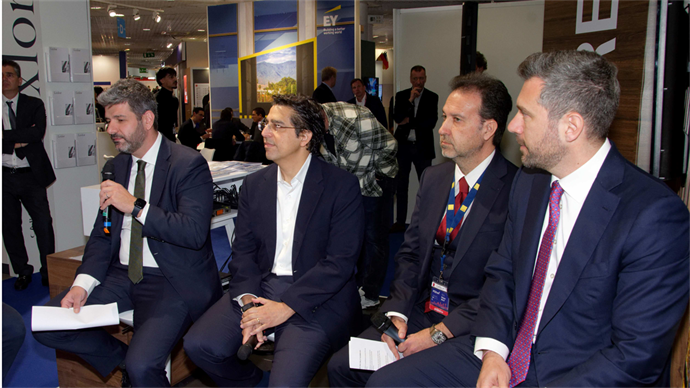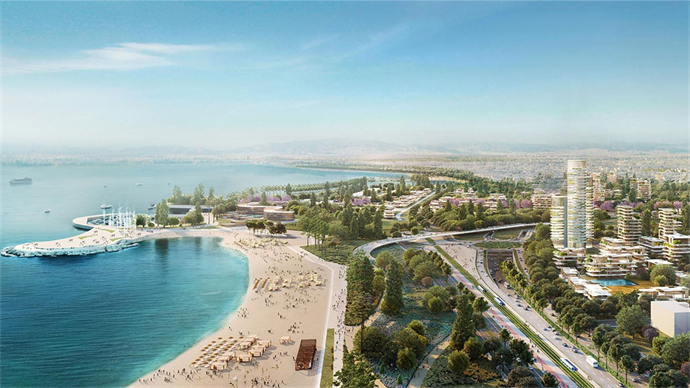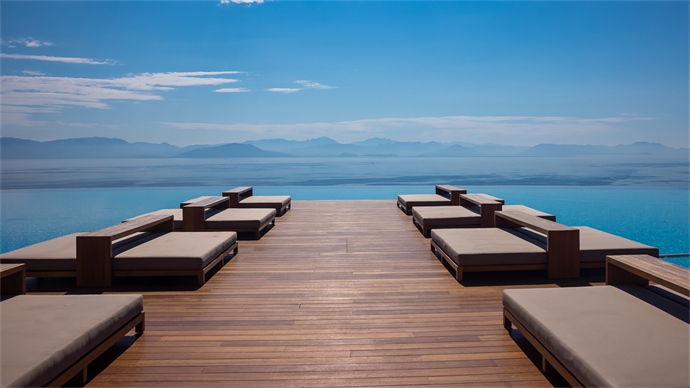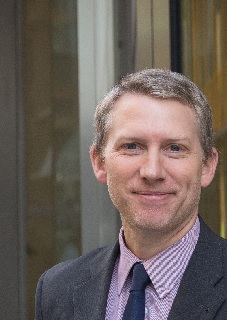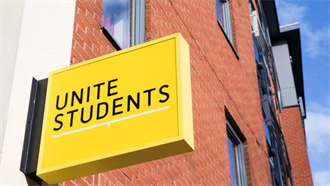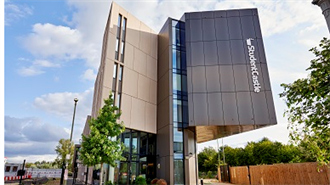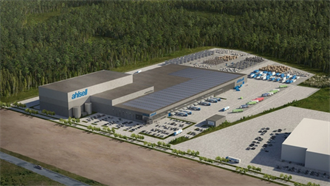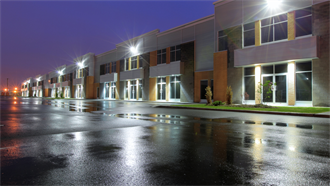From Volkswagen, Cosco, Google and Microsoft to a host of foreign real estate investors. How much do you know about Greece as a resurgent market? Four experts explain how the European country is now catching the eye for growth and stability.
Networking opportunities persuaded Enterprise Greece and members of the Greek real estate industry to organise a huge stand in the Riviera Hall of the Palais Des Festivals during Mipim.
On the morning of Day Two, the investment and trade promotion agency organised an information session as four experts, including CEO of Enterprise Greece, Marinos Giannopoulos, briefed guests and passing trade during a buzzing atmosphere.
Greece is carving out a reputation for being ‘business friendly’. Some international investors such as global real estate firm, Hines, which took part in the session, have already worked with Enterprise Greece, which provides investment services including financial incentives and fast-track processes.
The bigger picture is that international capital is coming. Singapore’s GIC, Hines, Quilvest Capital Partners, Azora, Goldman Sachs, Fidera, Cedar Capital Partners, and Dromeus Capital Group have invested in Greece’s real estate market.
A record €1.65 bn got invested in commercial real estate during 2022, which was 40% more than in 2021. Net foreign investment was up 68% in 2022 to reach almost €2 bn.
‘It’s down to the progress the country has made over the last three or four years, building and improving infrastructure and making it easier for investors to invest,’ said Giannopoulos.
Concrete examples include Piraeus, the port city within Greater Athens, which is becoming a logistics powerhouse with the likes of Cosco Shipping investing more than €1 bn in a new container terminal as the port expands to handle over 7.2 million twenty-foot containers.
It is also said that Greece is becoming a ‘world cloud computing hub’ soon to host three of the largest cloud service multinationals. Google has announced it will set up its first cloud region in Greece in a deal that could contribute €2.2 bn to the economy. Microsoft and Amazon have also made data centre and cloud computing technology announcements regarding Greece.
Deloitte placed Greece in the top 10 destinations for inward investors recently. The Economist magazine ranked Greece first among 34 nations for performance due to strong growth, narrow inflation, plunging debt to GDP ratios and a strong stock market.
Greece is making the most of grants from the EU - it raised €31.16 bn to be channelled through grants and loans and is expected to mobilise €60 bn of total investment in the country by the end of 2026, when all projects should have been implemented. ‘While there is volatility in the world, it is possible to secure investment,’ said Giannopoulos.
Dimitris Manoussakis, head of office, Athens, at Savills, has been involved in Greek real estate for more than 30 years. ‘We saw the first investors coming back from 2017 following the Global Financial Crisis.’
Stability is now a selling point as the country turns the corner after the dark crisis days of 2010 when the International Monetary Fund (IMF) stepped in with a €110 bn bail out.
It is true that Greece might not be fully back to where it was. In a talk three years ago, the director of the European Department of the IMF, Poul Thomsen said: ‘In terms of GDP per capital, we assumed it would take Greece eight years to return to pre-crisis levels. This was as bad as in the United States Great Depression in the 1930s. In fact it might take longer given GDP per capita in 2019 was 22% below pre-crisis levels.’ Yet, the markers are positive and GDP is growing unlike in the rest of Europe.
Hospitality is hot
Manoussakis said that in his opinion, the hottest sector at the moment is hospitality. It was a dynamic sector in the crisis, inextricably linked to Greece’s tourism industry. Even as early as 2012, investors picked over Greece looking for hotel opportunities but with limited success. Scroll forward to 2019, and the total size of investment was €390 mln, which then grew to €450 mln during the Covid year 2020, and again to €500 mln in 2021. In terms of rooms changing hands, this represents a leap from 2,800 beds in 2020 to 3,600 in 2021.
‘The qualitative change is the change in the management from family-run businesses - we now see professional management,’ said Manoussakis.
Data suggests that during 2022, 50 new hotels opened in hotspots such as Athens, Santorini and Mykonos as investors surged to meet the resumption of international travel.
Top brands such as Marriott have entered. Mandarin Oriental Hotel Group and Rosewood Hotels & Resorts are said to be looking.
In a landmark deal last year, GIC, the sovereign wealth fund of Singapore, acquired a stake in beach resort group Sani/Ikos Group (SIG), valuing the platform at €2.3 bn. One of the group’s newest properties will be the 395-room Ikos Odisa Corfu set to open in May.
Ramsey Mankarious, CEO and founder of hotel investment company Cedar Capital Partners, said his firm has been in Greece for seven years. The first acquisition was in Corfu where it invested in the Angsana Resort, an asset that was only half completed when Cedar invested. This was a common situation presented in which a private family investor fell in love with a luxury hotel but fell short when it came to expertise to see it through.
In December, Cedar invested in an under-construction hotel on Kea Island. It has also followed up with another asset in Porto Heli to be developed into an internationally branded luxury hotel.
Mankarious said: ‘Greece’s hospitality market has changed a lot. It has become more “institutional”. For many of our partners, such as Fidera, they would not have put Greece at the top of their investment list. But they are now actively looking, which is great. As Paul Gomopoulos of Hines has said, it is bad for competition but it is also great because the more institutional investors there are, the better it is to buy and sell.’
‘We see huge opportunities, such as buying family-owned hotels that we believe can be improved. We love Greece and we are here to stay!’
Hines has invested in Greece’s hotel sector as well as other asset classes as one of the very earliest and most influential companies that others took notice of.
Hines country head, Gomopoulos, described the firm’s experience of Greece as being like a ‘roller coaster’ but only has positive things to say about the country and Enterprise Greece.
It was one of the very few international property investors and developers to make a serious move in the wake of the Global Financial Crisis by opening an office in 2014. It did not make its first investment until 2017, but has since speeded up and now has around €1 bn of property investments under management, of which hospitality is the largest component. The firm is the proud owner of the Grand Hyatt Athens. Initially, the firm bought an existing family-owned hotel before repositioning and rebranding it.
Hines has since added six resorts in Crete. Alongside this, Hines has a ground-up residential development and retail and office assets. He says residential for sale and PRS are growth areas for the company, the latter being a sector Hines has done a lot of across Europe and the US.
‘We were quite patient, waiting for the right macroeconomic environment,’ said Gomopoulos. ‘But I think the roller-coaster element is behind us.’
‘Like most markets, there are always going to be challenges, but overall Hines feels Greece is very stable, more stable than many other European countries at present and the only European country whose debt/GDP ratio is improving.’
Hines says it is ‘heavily institutional’ but also entrepreneurial at the same time. ‘We like stable markets but are prepared to invest in what might be considered riskier ventures if we see opportunity. Hines had invested in Ireland a few years earlier at the peak of their financial challenges and that experience gave us confidence in repeating our success in Greece.’
He added: ‘People ask why would investors decide to invest in Greece now? I would reverse the question and ask why would they not? Greece is in the eurozone, it is stable, and we probably have the most business-friendly government, and we have proven to be resilient by living through a recession. We are now in a very different point in the cycle.’
ESG business model
Greece has been putting ESG at the heart of its development strategy. Enterprise Greece’s CEO said the country had been busy building a ‘green business environment. For example, Greece and the Volkswagen Group have agreed a ground-breaking mobility system on the island of Astypalea’.
This is an island of 100 square kilometres with a small population of 1,300 but 72,000 tourists each year.
The current transport system is transitioning to electric vehicles and renewable power generation. Astypalea is thus to become a model island for climate-neutral mobility. The agreement between Volkswagen and Greece was struck in 2020. At the time, Konstantinos Fragogiannis, deputy minister of foreign affairs, said: ‘Today we are launching the first “Smart Green Island” project in our country, which marks a major change in our outlook.’
At the centre of the project is an entirely new system with digital mobility services, including an all-electric, year-round ride sharing service designed to take the current very limited local bus service to a new level. Together with local partners, part of the traditional vehicle rental business will be transformed into a vehicle sharing service offering e-scooters from Volkswagen’s SEAT brand and e-bikes in addition to electric cars. This alone will help to significantly reduce the vehicle fleet on the island. In total, some 1,000 electric vehicles will replace about 1,500 vehicles with combustion engines. Volkswagen has just started to roll out its electric ID family to the market, with the introduction of several new models planned over the next few years.
Logistics on a roll
Savills’ Manoussakis said that besides hospitality, the Greek industrial and logistics sector has been the hottest.
Greek REITs and private equity funds have become very active. In fact, he said demand was so high there is often no available stock for them to buy, which has led to local institutional developers such as REITs becoming developers.
There is an area west of greater Athens called Attica West – Thriassio Pedio - where much logistics activity has occurred and where developers can still just about make a profit. But it is reaching saturation point in terms of land values.
This has inevitably pushed up rents. Rents for logistics properties have risen at least 20-25% in the past two years, inflating from €4.5 per m2 to €5.3 per m2. Yields have compressed commensurately from historical highs of 9.5% down to 7.5% or lower. Transactions under discussion are taking place for even 7% if not lower. This has led people to speculate a plateau has been reached. For ambient warehouses, it might take another couple of years to see new levels. And so, new logistics corridors could yet open up, especially to the north of the city offering cheaper land prices yet good connectivity.
Office and residential
Meanwhile, rental levels are up for offices – exceeding 15% over the past two years accompanied by rapid yield compression. Finally, the up-and-coming sector is residential.
‘This could be the leader for the next five years, especially build-to-rent, PRS, and purpose-built student accommodation,’ said Manoussakis.
The Greek real estate discussion during Mipim took place at a time of what appeared to be a new unfolding banking crisis, first with SVB bank in California, then two other US banks collapsing. On the same day as the debate, Credit Suisse’s shares cratered 30%. A few days after the end of Mipim, UBS took over Credit Suisse, spooking markets further, and with interest rate rises still being followed by the ECB.
So, how should foreign investors think about Greece? Should they regard it as a safer bet given its stability and upward trend? On the other hand, if Greece’s real estate market has become dependent on foreign investors, will the current global economic concerns lead them to turn off the taps?
‘It’s a really good question, actually,’ said Giannopoulos. ‘We at Enterprise Greece care for the investors’ needs so I come back to what Greece is doing, improving its infrastructure and everything else we have mentioned. The banks are better capitalised to deal with any bumps in the road, that’s also a point.’
Hines’ Gomopoulos said: ‘From the perspective of an international investor, it is a more attractive time to invest. A few years back there was maybe a hunt for yield but now in Europe there is an issue of values possibly falling. The next few months there will be very few acquisitions happening. Whereas in Greece, we have GDP growth and yield compression.’
‘It also depends on what type of investors you are talking about. The very opportunistic investors are already in Greece. I think what the market needs is the more core institutional investors.’
He referred to the investment by GIC in SIG. ‘If you look at that as a microcosm of the Greek real estate market, you have an example of a great platform where the first investors in were opportunistic in the form of Oaktree and Goldman Sachs, and now you have the next evolution with GIC. We have investors, but we are looking for the nature of investors to change in the coming years.’
Added Mankarious: ‘Normally institutional investors are the last ones to come into hospitality. In Greece, it is just the opposite. After Covid, tourism around the world boomed and capital such as GIC is all looking to invest in hotels in markets such as Greece. Greece has a huge advantage.’
Savills’ Manoussakis explained the market was ‘thirsty for new modern stock’, with demand outstripping supply. ‘The general negative trend we see in the rest of Europe is different for us. It is a paradox of the moment, but I think it will continue.’
Enterprise Greece’s CEO added how Greece was looking forward to regaining its investment-grade credit rating. ‘This will most probably unleash capital towards Greece. It will bring more core and core-plus investors.’
The panel did not really expect what was happening in the banking sector in the US and with Credit Suisse to affect Greece more than any other country, and anyway, one participant said what happened to Greece in 2010 was ‘self-inflicted’.
Then the panel took questions from the floor. One was from a representative of French hotel chain, Louvre Hotels Group, a subsidiary of Shanghai-based Jin Jiang International, a leading hotel and tour operating business in China.
‘We are now entering Greece with different investors,’ he told the event. ‘I have been exploring opportunities. I hope to sign some deals within the next few months.’
‘Greece has become a very attractive place to invest. There is much greater interest in branded hotels because historically there has not been such branded hotels in Greece, and now a lot of international investors are coming in who bring more international guests. I think the business environment has changed a lot. It is much more attractive now.’
CASE STUDY
The Ellinikon: 'A project to completely change the face of Athens’
The Ellinikon is one of the most significant real estate developments Greece has ever seen and might ever see. As an €8 bn regeneration project, it even ranks as one of the largest in Europe, so has a place on the mega-project world stage. Lamda Development is behind the gigantic scheme promising new residences, luxury hotels, a shopping district, 2 million m2 ‘smart park’ and sports spaces, museums, business park, offices, and an R&D hub. Thousands of sensors and monitors including devices to advise when rubbish bins need emptying are all part of it. Lamda is on record as saying The Ellinikon is expected to contribute to Greece’s GDP by 2.4% once the whole scheme is completed and over €14 bn of tax revenue to the state. It is set in what is dubbed the ‘Athens Riviera’ just 20 minutes from the Acropolis, and the aspiration is nothing short of a project that will completely change the face of Athens.

